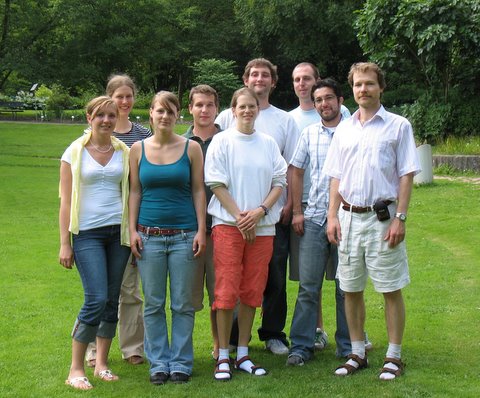Freiburg
From 2007.igem.org
Luckytaschka (Talk | contribs) (→Protocols:) |
Luckytaschka (Talk | contribs) (→Protocols:) |
||
| Line 67: | Line 67: | ||
[[Freiburg07/Purification|Purification ]]<BR> | [[Freiburg07/Purification|Purification ]]<BR> | ||
[[Freiburg07/Transformation|Transformation ]]<BR> | [[Freiburg07/Transformation|Transformation ]]<BR> | ||
| + | [[Freiburg07/Dephosphorylation|Dephosphorylation ]]<BR> | ||
== Sandbox - wiki test: == | == Sandbox - wiki test: == | ||
Revision as of 15:11, 24 October 2007
Contents |
Team Members:
Instructors:
Kristian M. Müller, Katja M.Arndt
Students:
Corinna Gruber
Natalia Maier
Philipp Mappes
Graduate Student:
Dinah Mattay
Advisors:
Andreas Hiltbrunner, Michael Reth, Bodo Rak
Project Summary
Integrated Sensor-Executor Proteins and Molecular Switches
Our goal is to design integrated molecular sensing and executing devices based on modular protein engineering. These integrated devices can then easily be used for the construction of complex systems. We fuse sensing proteins, which provide nano-mechanical movements or dimerization upon an external signal, to executing proteins, which depend in their activity on the nano-mechanical change in the sensing part.
To elucidate the possibilities of such a system we used the calcium-ion sensor Calmodulin and the light sensor system PhyA-Fhy1. To test execution we used the split enzymes DHFR or beta-lactamase or the fluorescent proteins CFP and YFP, which can form a FRET pair. Sensors and executors were geneticlly fused and tesetd in E. coli for activity. So far we could demonstrate Ca2+ dependent growth of E. coli with the DHFR[1]-Calmodulin-DHFR[2] construct.
final iGEM report: Ca2+ sensor
final iGEM report: light sensor
Biobrick compatible strategy for fusion proteins
The present BioBrick prefix and suffix rules are not compatible with modular protein design. Thus, we propose an extension of the present standard for fusion proteins in which two restriction sites are added in frame adjacent to the coding sequence.
final iGEM report: Fusion parts
Support:
[http://www.syntheticbiology.ethz.ch/synbiocomm/index SYNBIOCOMM]
[http://www.uni-freiburg.de/ Universität Freiburg], [http://www.uni-freiburg.de/wiss-ges/ Wissenschaftliche Gesellschaft in Freiburg im Breisgau]
[http://www.geneart.com GeneArt]
Lab-Work:
lab notes
plasmids
PCR primers
Lab Boxes
Protocols:
DNA sequencing
Ligation
Plasmid spin column prep
Glycerol stocks
General Gene-Protein Information
Purification
Transformation
Dephosphorylation

